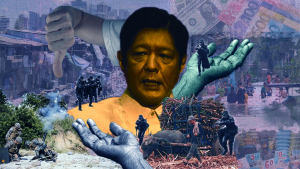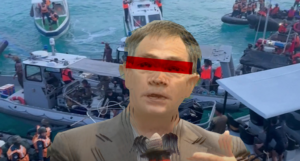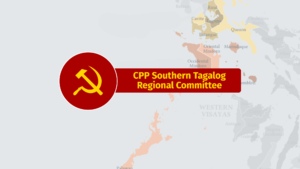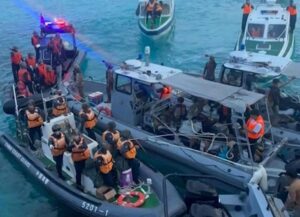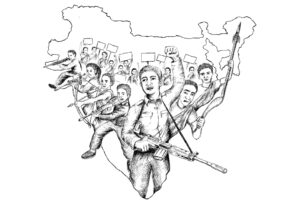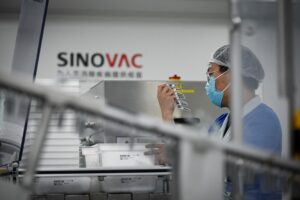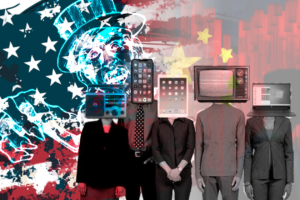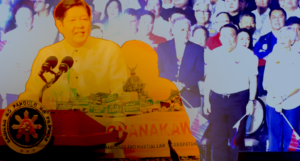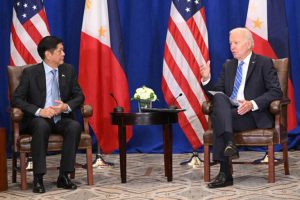Response to questions by Croatian journalist Ivan Popovic
Ivan Popovic (IV): Is CPP today on same grounds of Sison’s principles of revolutionary struggle
against American imperialism , feudalism and bureaucratic capitalism or that
struggle spreaded towards other forms of imperialism in the world?
CPP Information Bureau (CPP-IB): The CPP today is at the forefront of the Filipino people’s democratic revolution
to put an end to the three principal problems of US imperialism, domestic
feudalism and bureaucrat capitalism. It continues to persevere in advancing the
protracted people’s war. The text of Amado Guerrero’s (Sison) Philippine Society
and Revolution (PSR) continues to form part of the basic documents of the CPP.
Over the past five decades, the crisis of the semicolonial and semifeudal system
in the country, as described in PSR, has worsened and further degenerated. US
imperialism remains the most dominant economic and politico-military force in
the Philippines, despite the rise of China as an international economic and
military power, especially in the Asia-Pacific region. The CPP and the Filipino
revolutionary forces are acutely aware of China’s increasingly aggressive
posture and stand opposed to encroachments on Philippine maritime territory. The
bigger and more aggressive imperialist country remains to be the United States
whose troops remain permanently stationed in various military bases across the
Philippines, enjoying extraterritorial rights, docking their aircraft carriers
and other warships, flying their jetfighters and operating their drones to
conduct surveillance in any part part of the Philippines.
IV: We know you have military part of party, New People’s Army so how does military
struggle is going in paralel within Filipinies society , and what is your
strategy of that in the future?
CPP-IB: Under the CPP’s leadership, the NPA continues to wage guerrilla warfare in more
or less 100 guerrilla fronts across the country. Revolutionary armed struggle is
waged in the rural areas and combined with efforts to carry out the minimum and
maximum land reform programs and building mass organizations and the rudiments
of the people’s democratic government. Tactical armed offensives are mounted by
the NPA against the Armed Forces of the Philippines (AFP) as well as against
paramilitaries and police units used in the GRP’s counter-revolutionary war. The
peasant masses participate in a big way in armed resistance. In large parts of
the Philippine countryside, dual political power exists.
The Government of the Republic of the Philippines (GRP), a client-state under US
hegemonic rule, has declared it plans to decimate or cut in half the NPA’s
strength before the end of the year. It is rushing to increase the number of its
armed troops by 15,000, begging for US funding to upgrade and acquire weapons,
replenish its supply of bullets, bombs, mortars and artillery rounds in the vain
hope of swarming the countryside with its armed presence. They are only
succeeding in rousing people’s resistance by placing civilian communities under
its coercive rule, forcing people to become spies, conscripting them as
paramilitaries, accusing people of being armed rebels or supporters, forcing
them to “surrender” and ordering them around. Abuses of human rights run
rampant. The Philippine government is succeeding only in rousing ever greater
numbers to wage resistance and carry out revolutionary struggle.
IV: Did the CPP manage to consolidate it’s lines after parties grouping in 90ies?
CPP-IB: Yes, the Party was able to consolidate its forces in the 1990s at the heels of
the rectification campaign. From 1992 to 1998, the CPP succeeded in uniting the
greater majority of proletarian revolutionary cadres and NPA units under the
banner of the Second Great Rectification Movement. The rectification movement
was an internal education or ideological campaign to reaffirm the Party’s
adherence to Marxism-Leninism-Maoism, and its program for a people’s democratic
revolution to put an end to the semicolonial and semifeudal system. Ever since
the 1990s, the Party and all revolutionary forces have continued to grow in
strength and are steadily carrying forward the revolutionary struggle.
IV: President Gloria Arroyo on Setember 5th signed Proclamation on amnesty 1377
members of CPP and NPA with NDF, has this amnesty made in whole?
CPP-IB: Nothing came out of this Arroyo’s Proclamation 1377 in 2007 because the
parliament never acted to enact it into law. It was, thus, an empty
proclamation. Current GRP President Duterte has made similar promises to issue
an amnesty proclamation to facilitate the release of around 500 political
prisoners, mostly activists from the ranks of the toiling masses of peasants and
workers, as a goodwill measure to boost peace negotiations with the National
Democratic Front of the Philippines (NDFP). The promise has yet to be fulfilled.
IV: CPP is member of International Conference of Marxist and Leninist Parties and
organizations, so tell us what is the cooperation with similar organizations
like yourself in the world?
CPP-IB: As part of the ICMLPO, the CPP aims to encourage ideological and practical
exchanges with like-minded Marxist-Leninist parties around the world. In the
past, various multiparty conferences were held including that celebrating the
100th birth anniversary of Mao Zedong in 1993. Through the ICMLPO, the CPP draws
lessons from the experiences in revolutionary struggle waged by other communist
and workers’ parties, and at the same time, impart its own experience in waging
revolutionary struggle in the Philippine context.
IV: US State Department in 2008 declared you and NPA as two of 44 terrorist
organizations, your comment?
CPP-IB: The US government is using its so-called list of foreign terrorist organizations
(FTO) and its so-called “war on terror” to intervene in the Philippine’s
internal affairs. In 2001, it declared the Philippines as the “second front” in
its “war on terror” and came up with the so-called Operation Enduring
Freedom-Philippines to justify the establishment of the Joint Special Operations
Task Force-Philippines, a 900-strong contingent of American troops, which
established a military base inside Camp Navarro in Zamboanga City. Operation
Enduring Freedom-Philippines ceased operations since 2014. However, in October
2017, the US declared Operation Pacific Eagle to further strengthen its foothold
on the country and increase its military aid and intervention for
counter-guerrilla operations of the AFP against the NPA.
IV: Is today great writer Joma Sison still active on the field of revolutional
struggle which is last one against capitalism?
CPP-IB: Prof. Jose Ma. Sison, founding chair of the CPP, remains active in revolutionary
work serving as Chief Political Consultant of the National Democratic Front of
IVthe Philippines. The NDFP is the united front organization of at least 17
revolutionary underground organizations, including the CPP and NPA, which
participate in advancing the people’s war. The NDFP represents the incipient
people’s revolutionary government in peace negotiations with the GRP and in
establishing proto-diplomatic relations with other states. Comrade Joma helps
the NDFP Negotiating Panel in peace talks with the GRP. The CPP leadership also
actively seeks Comrade Joma’s guidance in various matters in revolutionary work.
He remains active in political struggle, especially, in the current struggle of
the Filipino people against the emerging dictatorship of the fascist Duterte
regime.
IV: Please make a paralel between your action in time of Ferdinand Marcos and his
successor Corazon Aquino?
CPP-IB: Under the Marcos dictatorship, the worst facets of the ruling semicolonial and
semifeudal system was brought to the fore, as the Filipino people suffered from
grave military abuses, widespread killings, mass arrests and political
imprisonment. Unleashing the full force of reactionary violence, the Marcos
dictatorship incited the Filipino people to unite and resist and eventually
cause its downfall in 1986. With the force and momentum of the antifascist
struggle, Marcos successor, Corazon Aquino, was obliged to release political
prisoners and preside over the restoration of formal rights as contained in the
1987 constitution. However, it would not take long for Aquino to “unleash the
sword of war,” carry out the massacre of a peasant demonstration in early 1987,
mount a total war against the people and the revolutionary armed struggle,
support armed vigilantism and endorse the US doctrine of “low-intensity
conflict.” The NPA would continue to grow and reach peak strength in 1987. It
will be drawn into premature regularization and military adventurism from 1988
towards 1991 resulting in losses and self-constriction up until 1992 before the
CPP mounted the rectification movement.
IV: What is your position on populist rethoric of President Rodrigo Duerte (who also
declared NPA as terrorist organization and declared war to it) or he is just
another American player in this part of Asia?
CPP-IB: Duterte currently presides over the client-state in the Philippines. The ruling
state under Duterte is dependent on US economic and military support. Despite
his noisy anti-American rhetoric at the start of his term, Duterte made no
actual steps to assert Philippine national sovereignty. He refused to heed the
Filipino people’s demand to abrogate the Mutual Defense Treaty of 1956, the
Visiting Forces Agreement of 1998, the Enhanced Defense Cooperation Agreement of
2014 and other unequal military treaties with the US. He made no formal
protestation against the presence of US military troops and advisers in the
country. In declaring martial law in Mindanao and mounting the war of
destruction against Marawi City, he paved the way for large-scale US military
intervention, where the US military assisted and combined with the AFP in
relentless aerial bombardment and adapting the tactics applied by the US against
Raqqa in Syria and Mosul in Iraq. A large part of Marawi City is being eyed as a
military reservation by the AFP and the US. At the height of Duterte’s siege
against Marawi in October 2017, the US military declared Operation Pacific
Eagle-Philippines and its continuing “war against terror.” In November, Duterte
declared the CPP and NPA as “terrorists” stating explicitly that such was in
line with US declaration. Under Duterte, the US military and the AFP mounted
joint military exercises in 2017 and 2018, with at least 3,000 US troops
deploying several US warships, jetfighters, amphibious landing vehicles,
submarines and other war materiél in the Philippines.
Duterte is tolerated by the US for allowing China to establish its foothold in
the South China Sea by constructing airports and other military facilities.
Duterte also does not make statements nor actively opposes US military
operations in the South China Sea which it euphemistically calls “freedom of
navigation operations” (FONOPs) but are nothing but power projection operations
to assert US military might in the area. The US uses its military exercises in
the Philippines, its military facilities under EDCA, its access to Philippine
seaports and airports under the VFA, to support and boost its FONOPs in the
South China Sea. It is, thus, the height of hypocrisy, that the US declared
itself opposed to China’s militarization of the South China Sea, when it itself
has long militarized the area.
Duterte has adapted the policy of passivity in relation to US and China
saber-rattling and militarization of the South China Sea and parts of the
Philippine maritime territory. This is in contrast to an active policy of peace
which requires one to demand the imperialist powers to put an end to the policy
of war and racing to establish their military might against one another.
At the outset of Duterte’s term, it was apparent that China was hopeful that
Duterte will be more pro-China than pro-US, promising Duterte with at around $20
billion in loans and aid. No substantial portion of these promises have
materialized, however, after it became apparent to China that Duterte was not
about to turn his back against the US which he has declared an “indispensable
partner” and which he thanked profusely for the military aid extended to his
regime’s wars against the Filipino people.

